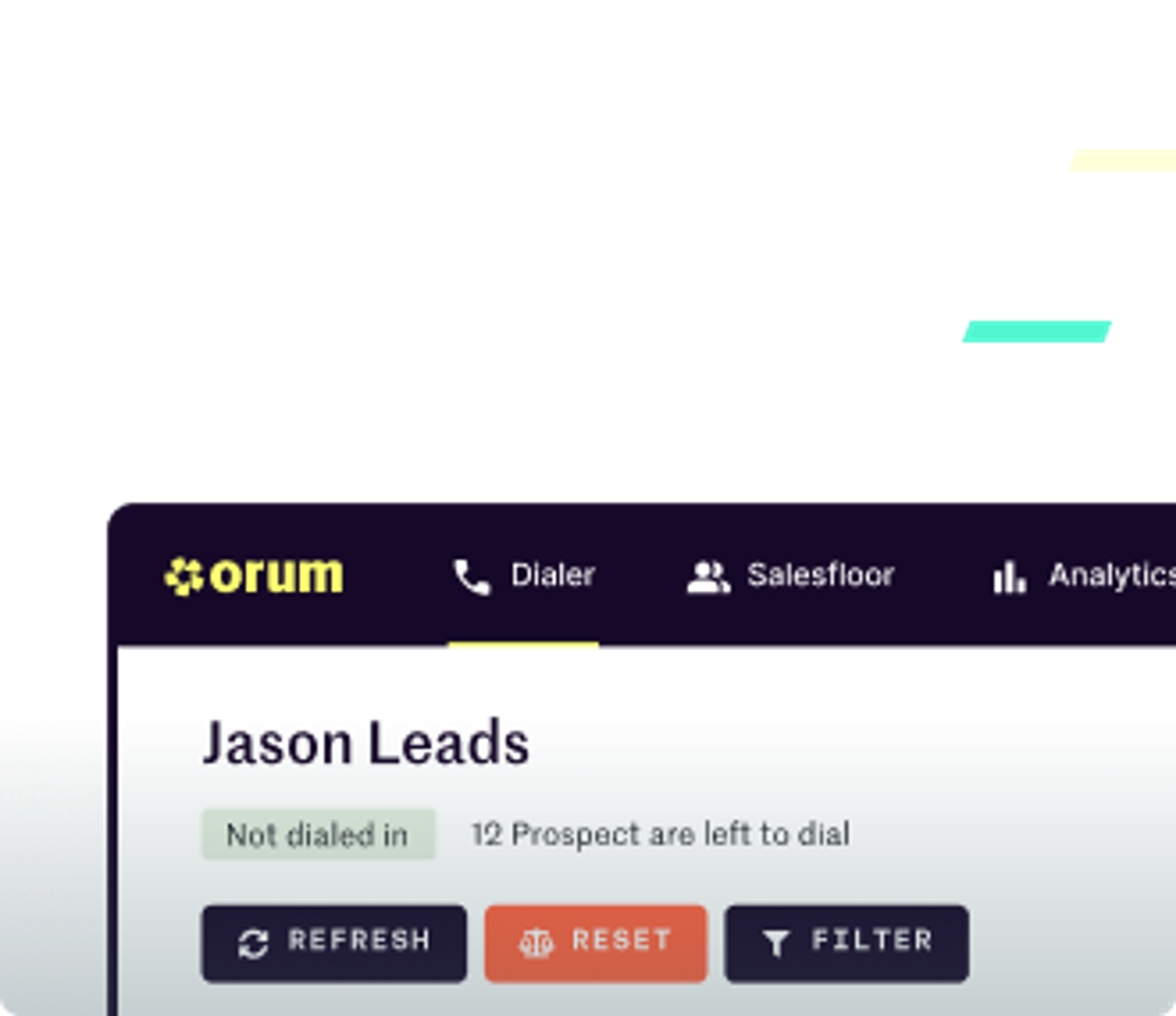De-escalation Roleplays and Templates for Difficult Sales Interactions


It’s every salesperson’s dreaded scenario: They jump on a sales call only to be faced with a frustrated—if not irate—prospect.
Upset customers are less likely to trust your sales staff, proceed with sales calls, and ultimately purchase. They also are much more stressful for sales staff to manage, potentially contributing to burnout, frustration, and even high turnover amongst your team members.
While dealing with unhappy customers is an inevitability, there are de-escalation strategies sales teams can use to salvage sales calls and client relationships. In this post, we’ll discuss multiple de-escalation tips and five distinct roleplay templates to effectively manage challenging customers.
Improve sales team performance and the customer experience
Help reps learn and practice communication skills like de-escalation techniques with Orum.
Request a demo today
What are the benefits of mastering de-escalation?
You can use de-escalation to diffuse tense situations with prospects or customers who may be angry, frustrated, or upset. It's about bringing down the emotional temperature of an interaction to maintain a productive business relationship.
Customers may be frustrated for any number of reasons. They may feel annoyed at an interruption from cold calls, for example. Or, they might become angry if they feel they aren’t being heard by the salesperson they’re speaking to.
Mastering de-escalation offers the following benefits:
- Effectively overcome objections. Aggravated customers aren’t always willing to listen to your solutions, no matter how great your problem-solving is. Effective de-escalation can help you present strong solutions that address a customer’s objections in a way they can understand and trust.
- Improved customer relationships. If you’re able to salvage a negative customer experience, you can begin to build trust on the phone and lay the foundation for stronger relationships long term.
- Reduced stress for sales reps. Upset leads and customers are stressful for sales reps— especially when they feel the customer isn’t justified in their level of satisfaction. High levels of stress can result in burnout, which can cause decreased productivity and higher turnover rates. Since 70% of respondents in our 2024 State of Sales Development report say quota is up for their SDRs, avoiding burnout is especially important.
7 key de-escalation techniques
There are plenty of verbal de-escalation tips you can use on sales calls to resolve tense situations quickly and effectively. This is true even without the ability to leverage disarming nonverbal communication like body language and facial expressions.
These seven de-escalation techniques are highly effective for phone-based or virtual sales calls:
- Ask open-ended questions. These questions encourage customers to think about what you’re asking and respond with detailed answers. It can help you better understand their frustration and may help them feel like you care about their concerns.
- Practice active listening. Active listening practices—like asking clarifying questions and saying “I understand”—can show customers that you’re invested in the conversation and their concerns.
- Show empathy. Expressing empathy for the prospect’s frustration and sharing that you want to find a solution puts customers at ease and may help establish trust.
- Prioritize clear and concise communication. Getting straight to the point can prevent further frustration that may otherwise occur in less-focused conversations.
- Set boundaries. Allow customers to set boundaries on their time and energy, asking if you can have just five minutes to find a win-win solution. You can also set boundaries, asking customers to adjust their tone of voice if they’re swearing or exhibiting aggressive behaviors.
- Provide different solutions. Solutions-focused conversations—especially those that address customer concerns—can help resolve frustration. They show you're invested in the other person’s feelings, objections, and immediate needs.
- Stay calm. While it can be difficult, staying calm and collected while dealing with frustrated customers is essential. Remain focused on understanding the customer’s frustration and offering solutions to address their concerns. When in doubt, remember they may be having a bad day or even struggling with their mental health—it’s not personal and it’s likely not about you.
De-escalation roleplays and templates for handling challenging customers
Since dealing with difficult customers is inevitable, it’s essential to incorporate de-escalation training programs into your sales coaching initiatives. Doing so will arm your sales team with the skills to resolve conflict, build customer trust, and salvage at-risk deals.
Since practice makes perfect, we’ve included five de-escalation roleplay templates your team can use for skill development.
Responding to an angry prospect
Scenario: A prospect responds angrily to a cold call
Template:
Sales rep:
“Hi [Prospect’s Name], I appreciate you taking my call. I understand this might not be the best time for you. Can you share what’s bothering you? I want to ensure I respect your time and concerns.”
[Listen actively and acknowledge their feelings.]
Sales rep:
“Thank you for sharing that. It sounds like [summarize their concern]. I’m here to help. Can we take a moment to see how I can address this?”
Handling objections calmly
Scenario: A prospect raises a strong objection to your offering
Template:
Sales rep after hearing a clear objection from a customer:
“Got it [Prospect’s Name], To make sure I understand correctly, you’re frustrated with/concerned about [restate the customer’s concerns]. Are you able to tell me more about that?”
[Listen to the customer, and give them the opportunity to elaborate on their objection.]
Sales rep:
“I completely understand your concern— that’s something a lot of our customers are worried about. We do have a [solution/product/feature/price] that would actually resolve this issue and could be a great fit for what you need. Are you open to me sharing a little more about it?”
Dealing with a disconnected customer
Scenario: A current customer expresses frustration over a service issue
Template:
Sales rep:
“I’m so sorry to hear that you’ve had problems with support/uptime/service reliability. I understand why you’re frustrated, and we’re taking the problem seriously. Our team is currently working on preventing this from being an ongoing issue. [Explain solution].”
[Allow the customer to respond.]
Responding to negative feedback
Scenario: Receiving negative feedback during a follow-up call
Template:
Sales rep:
“Thank you for bringing this to my attention. I’m sorry you had this experience, I’m going to address this with the appropriate department. I’d love to talk about how we can make it right.”
[Listen to the customer response with active listening.]
Sales rep:
“Thanks for your understanding. From my understanding, your most significant concerns are [reiterate customer’s concerns]. I believe we have several solutions to address this. First, [list different solutions].”
Re-engaging a silent prospect
Scenario: A prospect who has gone quiet after an initial conversation
Template:
Sales rep:
“Hi, [customer’s name]! I know it’s been a few weeks/months since we’ve last connected. I was hoping you had a few minutes today to discuss [product/service] further.”
[Listen to the customer’s response]
Sales rep (If they say yes):
“Great! I know last time we talked, you mentioned [discuss priorities]. Are these still your current priorities?”
Sales rep (if they say no):
“I understand now isn’t a good time. I do believe that our [product/service/feature] could help you with [core pain point]. Is there another good time for a conversation, or should I follow up at a later date?”
Tips for using de-escalation templates
Our de-escalation templates can be helpful for training purposes, but they’re just a starting point. Here are a few tips to get the most out of them:
- Personalize: Adapt the template to fit the specific situation and individual’s communication style. You’ll handle negative feedback about your product differently than negative feedback about a specific salesperson; the first may require product education, while the second may require switching the customer to a new account manager.
- Use the right tools: Platforms like Orum can help improve your templates and coach reps to meet their full potential. Features like our Virtual Salesfloor and Call Library let your team practice with these templates, see them used in live sales calls, and provide feedback to promote mutual growth.
- Practice specific situations: Each sales team may have a common list of objections or complaints they receive often. Customize the templates to address these specific situations so that your sales team is equipped to handle them on auto-pilot.
- Roleplay regularly: Practice de-escalation techniques the same way you practice closing techniques to build your team’s confidence in these skills.
- Remember that the templates are just meant for guidance: Never rely so heavily on a template or script that you fail to respond authentically to customers. It’s essential that customers feel heard, and sometimes that means going off-script.
Partner with customers to find resolutions
While frustrated customers can be difficult to manage, the fact that they’re speaking to your sales team is a good sign. It means they want to be heard, and under the right circumstances, are open to a resolution.
All customers want to feel listened to and have a partner that helps resolve their issues proactively. If your sales team implements strong communication skills, empathy, and de-escalation techniques, customers will feel understood and valued. This opens the door to a productive, solution-centered conversation that can salvage the relationship and the deal.
Orum can improve your sales training with live feedback, objection data, and peer-to-peer coaching to help sales reps practice de-escalation techniques and prepare for any objection.
Build sales skills through direct feedback and coaching with Orum
Practice de-escalation techniques and get feedback in real time for skill development.
Request a demo today
Frequently asked questions about de-escalation techniques
What are some de-escalation techniques for angry customers?
The following de-escalation tactics can promote effective communication and may reduce a customer’s frustration:
- Asking open-ended questions
- Practicing active listening
- Expressing empathy
- Prioritizing clear and concise communication
- Setting boundaries
- Providing options
- Staying calm





